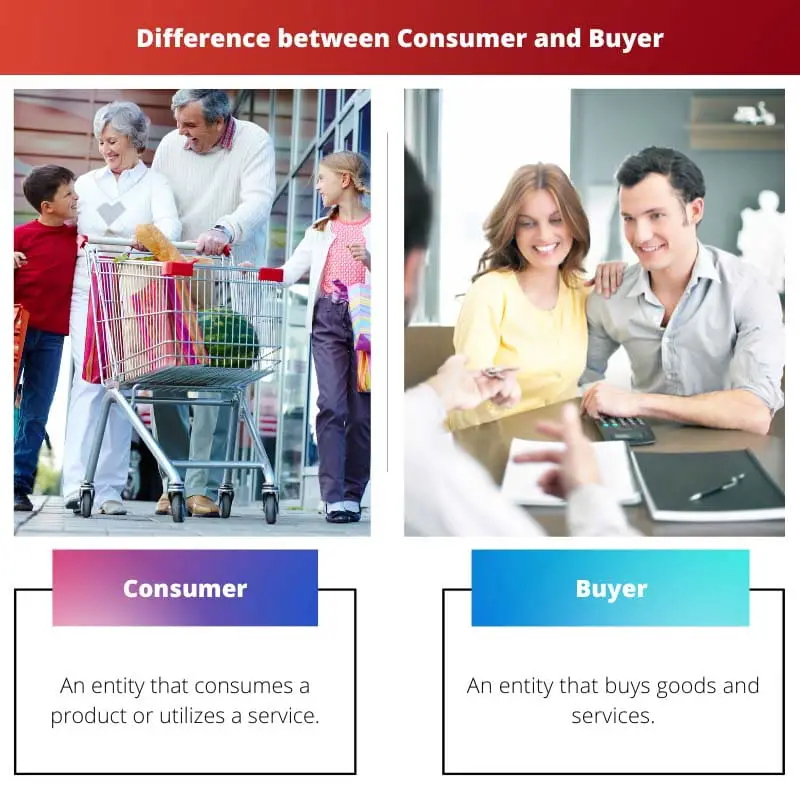People use the terms, Consumer and Buyer interchangeably because they believe both are synonyms. However, the definition of both terms is different.
Therefore, it is essential for people running businesses to know the difference and for persons in the literature field or people trying to grasp English better.
Key Takeaways
- Consumers use or consume products and services, while buyers purchase products and services for themselves or others.
- Buyers make purchasing decisions based on various factors, including price and quality, while consumers evaluate products based on personal preferences and needs.
- A buyer can be a consumer, but a consumer is not always a buyer, as they may use a product purchased by someone else.
Consumer vs Buyer
A consumer is anyone who uses a product or service, while a buyer is someone who purchases a product or service. The key difference between them is that a consumer uses the product, whereas a buyer makes the purchase. A buyer can also purchase a product for someone else to use, while a consumer always uses the product themselves. Various factors influence the decisions of both buyers and consumers, including price, quality, and availability.

A Consumer is a person who utilizes a service and therefore is the last owner of that product. Since Consumers use a product, they are also known as users or end-users.
Moreover, Consumers purchase the goods they use, but it isn’t necessary, and they can consume goods without paying for them.
A buyer is someone who exchanges goods for money. Individuals, groups, and businesses purchasing a product from a seller are considered Buyers.
Some Buyers obtain a product intending to consume it, and others resell it, but in any case, they contribute directly to the growth of any business.
Comparison Table
| Parameters of Comparison | Consumer | Buyer |
|---|---|---|
| Definition | An entity that consumes a product or utilizes a service | An entity that buys goods and services |
| Purpose | Consumer’s primary goal is to use a product | The Buyer’s primary purpose is to consume or resale a product. |
| Mode of obtaining the product | A Consumer does not always pay for the goods they get | A Buyer always pays for the products they get |
| Other names | User, end-user | Customer, reseller |
| Type of entity | Individual, family, or a group | Individuals, businesses, organizations |
| Etymology | Originated from consumere, a Latin word meaning “use up.” | Originated from bycgan, an Old English word meaning “owning something by paying for it.” |
Who is Consumer?
Consumers are people responsible for the usage of products and services. They are the last in the supply chain and are therefore known as end-users or users.
Every enterprise makes products by keeping the needs of Consumers in mind, as they are the only source of revenue and growth.
Some Consumers purchase the products they use, but this doesn’t happen in every case. Consumers can obtain the goods by other means, like gifts, but the aim is to utilize that product no matter how it was procured.
Everyone with the aim of using a service and not reselling the obtained products is a Consumer – a group, family, individual, or organization.
The word “Consumer” originated from the Latin word consumere, meaning “to waste” or “use up.” Furthermore, Consumer was also derived from the Old French word consumer, meaning “to consume.”
Theoretically, a commercial organization can be a Consumer, but according to laws in different states, only living persons are considered Consumers, not businesses or enterprises.
This is done to establish substantial Consumer rights and enforce them. Some of the rights given to Consumers are The right to safety, the right to choose, the right to be informed, etc.

Who is Buyer?
Buyers purchase products or services with the purpose of either consuming them or reselling them. Anyone who buys something from a seller by paying money (or something else) is regarded as a Buyer.
In other words, Buyers are the people who pay for the ownership of goods.
Based on the two different aims of Buyers, they are divided into two categories: Trade Buyers and Final Buyers. Trade Buyers purchase products to generate revenue by reselling them.
For example, manufacturers, distributors, wholesalers, retailers, etc. On the other hand, final Buyers purchase a product for their use or buy it for someone else. In any case, they don’t wish to resell their goods.
Examples of Final Buyers are families, individuals, etc.
Buyer originated from the Old English word bycgan, meaning “procure something by paying for it.” Also, the roots of the word “Buyer” are linked with the Proto-Germanic word bugjan, meaning “purchase.” Later, “Buyer” was derived from the agent noun “buy.”
Buyers are the dominant source of revenue for businesses and enterprises as they are the ones who pay for the produced services and goods.
Therefore, there will be no money in the market without buyers, which means no businesses and no development.

Main Differences Between Consumer And Buyer
- Consumers are entities that utilize goods, products, and services. On the other hand, Buyers obtain products by paying for them through money or other methods.
- The purpose of a Consumer is to use services. On the other hand, the aim of Buyers is to consume or resell the obtained goods.
- Consumers don’t necessarily pay for the products they use. On the other hand, Buyers always pay for their acquired products.
- Consumers are also known as end-users or users. On the other hand, Buyers are known as customers, resellers, etc.
- Consumers can be individuals, groups, or families, whereas Buyers can be organizations, individuals, and groups.
- Consumer originated from consumer (Latin word), meaning “to utilize.” On the other hand, Buyer originated from bycgan (an Old English word), meaning “acquiring things by paying.”

- https://books.google.com/books?hl=en&lr=&id=ajDiBAAAQBAJ&oi=fnd&pg=PP1&dq=consumer+&ots=eyTTLv1kGI&sig=puHxshyMh7UcY-0lDR8VjEXVLPk
- https://heinonline.org/hol-cgi-bin/get_pdf.cgi?handle=hein.journals/antibull53§ion=26
